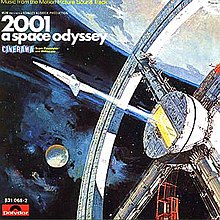NOVEMBER 28, 2024 – I remember when 2001: A Space Odyssey, directed by Stanley Kubrick, first hit the theaters. At the time I was a freshman at Sterling School, a small boarding school in Craftsbury Common, a hilltop hamlet tucked away in the Northeast Kingdom of Vermont. There was no theater in our little village, so those of us who’d signed up to see the movie rode the school’s lone bus to Hardwick, 12 miles due south. Mr. Snell, one of the history teachers, ground the gears of the vehicle while Monsieur Moutard (I kid you not; moutard is French for “mustard.”), one of our French teachers, came along for the ride. I remember clearly the movie, of course, but for some reason what really worked its way deep into my long-term memory was the scenic view of the two-mile-long narrow Lake Elligo on my side of the bus as we raced down the highway. I was mesmerized by the simultaneously dual speed of the scenery—trees along the edge of the road flying by in a blur while the opposite shore moved more slowly, deliberately, giving me a chance to notice details.
As I now reflect on that memory more than a half century later, I see its analogy to the passage of time: if you’re holding your breath or waiting for the red light to change at Hoyt and Snelling or . . . waiting on your son’s PET scan results . . . time ticks away slowly, like the opposite shore of Lake Elligo. When you’re 70, though, recalling memories formed when you were 14, your lifetime becomes a blur like the trees rushing by the bus windows.
From a broader perspective, in the moment and from day to day, the full effects of our epoch can’t be accurately perceived as current events—the trees—whirl by. Only in time and by a more deliberative examination does the grand story—the opposite shore of Lake Elligo—come into focus and acquire wholistic meaning.
This post is number 2001 in my five-and-a-half trips around the local cosmic ball of nuclear fusion. Recently, someone asked if I go back and read any of my posts. In response I said, “No. I’m afraid if I did, I’d realize how much they need to be edited.” My statement acknowledged that though I strive for technical excellence, I’m no slave to perfection. I write for other reasons.
My perspectives on this blog are short-term and long-term. From an immediate angle, my posts capture fleeting thoughts, reactions, encounters, and recollections. In this regard, Write Makes Might mirrors my penchant for photography. When I bought a compact aim-and-shoot Olympus camera 15 years ago, the blinds and shutters were lifted from the windows of my previously closed-up view of the world. Instead of walking, biking, moving about like a plodding horse fitted with blinders, with the aid of the camera lens I began to see my surroundings in a whole new and fascinating light. From subtle details to prominent features, what had been obscure, unnoticed and ignored by my inattentive eyes now developed more interesting lines, shapes, color, lighting, and compositional arrangement. Likewise, when I adopted the daily discipline of writing for a readership of more than myself, I learned to be more observant, reflective and introspective: given my need for “material,” I had to be in constant search for it.
From a longer-term vantage point, against the backdrop of my own and broader societal evolution, even revolution, this collection of posts might someday transform itself into a broader narrative of something meaningful. How quaint, how prescient, how spot on or how far off will my recorded thoughts appear when the larger story of my life and the world around me plays out?
Meanwhile, I’ll maintain my seat on the bus to the theater, and looking out the window, I’ll see the trees fly past as I watch the opposite shore of Lake Elligo form a cogent scene along deep waters.
Subscribe to this blog and receive notifications of new posts by email.
© 2024 by Eric Nilsson
